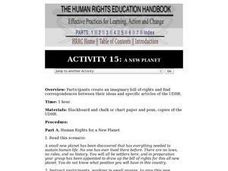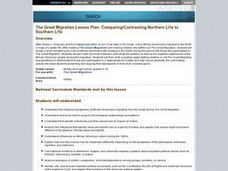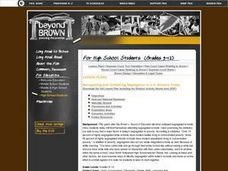PBS
Breaking the Code: Actions and Songs of Protest
Ezell Blair, Jr., David Richmond, Franklin McCain and Joseph McNeil changed history. Their sit-in at the lunch counter of the Woolworths in Greensboro, North Carolina on February 1, 1960 became a model for the nonviolent protests that...
Curated OER
Breaking Barriers
Students investigate racism in the 20th century by exploring U.S. History. In this Civil Rights lesson, students review the history of slavery, the Civil War and the fight for equality in the mid 1900's. Students complete Civil Rights...
Curated OER
Fight For Your Right - Leading A Revolution of Change
Students examine civil rights. In this civil rights lesson, students research human rights issues of United States history. Students then discuss their research findings and write Bill of Rights statements for the topics they researched.
Curated OER
Desegregation and the Courts
Students investigate Judge Garrity's ruling in the Boston bussing dilemma. In this desegregation instructional activity, students view segments of "Eyes on the Prize" and examine the role that courts played in desegreration. Students...
Curated OER
"The Story of Ruby Bridges"
Third graders examine the role of Ruby Bridges in the U.S. Civil Rights Movement. They listen to the teacher read the book "The Story of Ruby Bridges" by Robert Coles, identify what is fact or opinion in the story, and sequence events in...
Curated OER
Children's March Teacher's Guide, Activity 6
Students explore the role of gender in the Civil Rights Movement. In this Children's March instructional activity, students watch "Mighty Time: The Children's March" and respond to the provided discussion questions that accompany it....
Curated OER
Why Can't I Vote?
Fourth graders take an unannounced test (failure is expected) and the top scores are rewarded with candy bars. They compare this test to the literacy tests given before 1960 and votes to candybars. They journal their responses.
Curated OER
Active Citizenship: The Civil Rights Work of Bob Moses
Students discuss and describe the impact of Bob Moses as an activist, compare and contrast the work of Bob Moses in the 1960's and today and develop an action plan regarding an issue they feel strongly about.
Curated OER
Taking A Stand - Rules and Laws
Students explore the purpose of rules and laws in society, as well as some of the basic tenets of the Constitution that address equal rights for all citizens. Next, they examine historical examples of segregation and consider its impact...
Curated OER
Giving Human Rights a Human Face
Students produce a creative expression of an article of the Universal Declaration of Human Rights. They may also create posters to serve as reminders for creating a human rights environment or community.
Curated OER
Human Rights Education Handbook: A New Planet
Students create an imaginary bill of rights and find correspondences between their ideas and specific articles of the Universal Declaration of Human Rights.
Curated OER
Rosa Parks Refused to Do What?
First graders listen to two books about Rosa Parks. They contribute factual information for a web. They listen to an interview with Rosa Parks on the internet, adding more information to the web. They write and illustrate a book using...
Curated OER
Dr. Martin Luther King, Jr., a study in celebrating people
Learners analyze obstacles in their own life by studying Dr. Martin Luther King, Jr. In this humanity lesson, students create T-charts listing the obstacles one faces in life and how they can be overcome. Learners compare and contrast...
Curated OER
Evolving Views about Minority Rights in the United States
Tenth graders compare and contrast majority and minority outlooks on issues. In this social justice lesson, 10th graders research majority and minority values regarding the Salem Witch Trials, Plessy v. Ferguson, the McCarthy hearings,...
National Endowment for the Humanities
Slavery and the American Founding: The "Inconsistency Not to Be Excused"
High schoolers examine slavery in the revolutionary and colonial eras of the United States. In this slavery lesson, learners investigate the presence of slavery in early America, the language of the Constitution, and the intent of the...
Curated OER
Henry's Freedom Box
Young scholars explore the Civil War by reading a children's book in class. In this underground railroad lesson, students read the story Henry's Freedom Box and discuss the plot, settings and characters. Young scholars create their own...
Curated OER
Valuable Lessons
Students explore how immigration, citizenship, due process of law, and the freedoms of speech and assembly have shaped American values throughout American history
Curated OER
Comparing/Contrasting Northern Life to Southern Life
Students compare and contrast the lives of African Americans who moved North vs. those who stayed in the South during the era of Jim Crow Laws.
Curated OER
Continuity or Change? African Americans in World War II
Young scholars examine the experience of African Americans during World War II by analyzing primary sources and formulating historical questions. They evaluate if the African American experience during World War II represents continuity...
Facing History and Ourselves
What is Justice After Genocide?
High schoolers explore the meaning and implications of genocide. In this human rights lesson, students investigate the Aremenian genocide that took place in Turkey and the subsequent trials of the leader of the genocide held by the...
Curated OER
Recognizing and Combating Segregation in U.S. Schools Today
High schoolers explore the prevalence of racism and statistical segregation in America's schools. They design a project to investigate how the racial makeup of their school compares to other schools. In addition, they evaluate their...
Curated OER
The Fight to End "Separate but Equal" in American Schools
Students study the court cases related to Brown v. Board of Education and the "separate but equal" standard established by Plessy v. Ferguson. They create an informational display that can be used to teach others the particulars of the...
Curated OER
Using High Stakes Testing to Make Students and Schools Accountable for Learning
Students conduct an informal survey about their views on high stakes testing and use basic computation skills to evaluate results as a group. They participate in activities related to high stakes testing and "No Child Left Behind"...
Curated OER
One Person CAN Make a Difference
Students illustrate how the actions of one person can make a difference. They identify school and community issues to address and complete group projects and action plans for making changes in the school or community.
Other popular searches
- Civil Rights Movement
- Civil Rights Act
- Civil Rights Harriet Tubman
- Civil Rights Music
- Civil Rights Movement Music
- Civil Rights Act 1964
- Civil Rights Era
- Civil Rights Act of 1964
- Civil Rights Legislation
- Children's Civil Rights
- U.s. Civil Rights
- American Civil Rights Movement

























